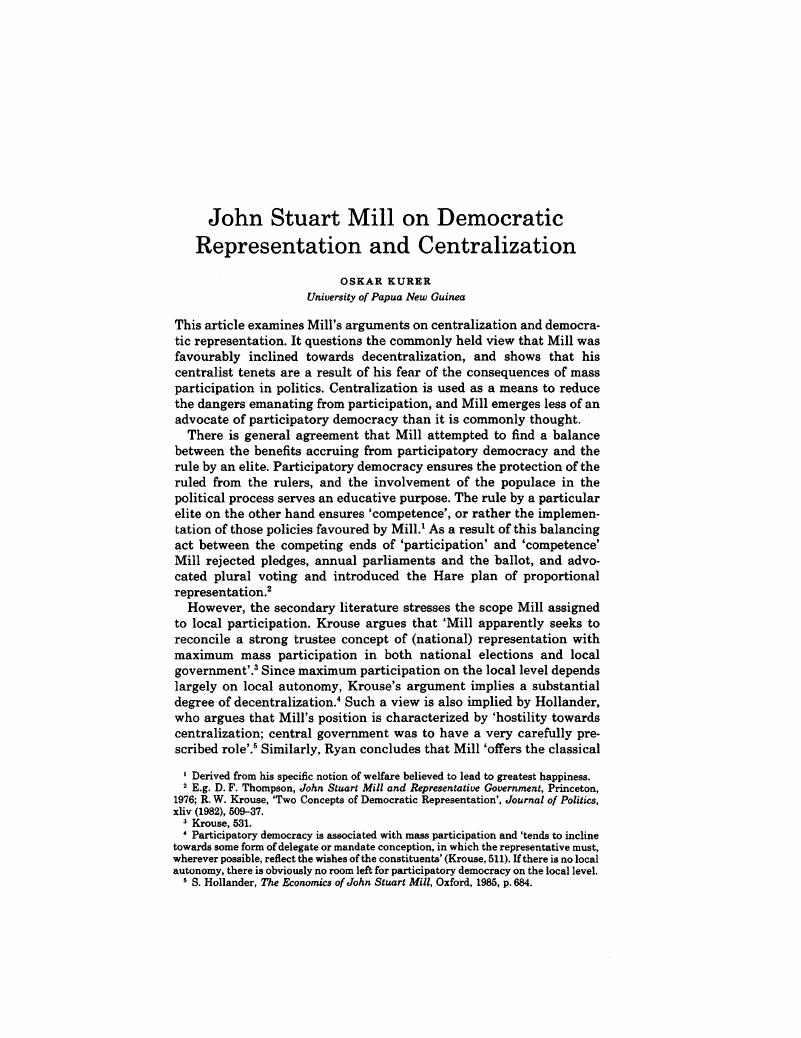Article contents
John Stuart Mill on Democratic Representation and Centralization
Published online by Cambridge University Press: 26 January 2009
Abstract

Information
- Type
- Discussion
- Information
- Copyright
- Copyright © Cambridge University Press 1989
References
1 Derived from his specific notion of welfare believed to lead to greatest happiness.
2 E.g. Thompson, D. F., John Stuart Mill and Representative Government, Princeton, 1976Google Scholar; Krouse, R. W., ‘Two Concepts of Democratic Representation’, Journal of Politics, xliv (1982), 509–37.CrossRefGoogle Scholar
3 Krouse, , 531.Google Scholar
4 Participatory democracy is associated with mass participation and ‘tends to incline towards some form of delegate or mandate conception, in which the representative must, wherever possible, reflect the wishes of the constituents’ (Krouse, , 511Google Scholar). If there is no local autonomy, there is obviously no room left for participatory democracy on the local level.
5 Hollander, S., The Economics of John Stuart Mill, Oxford, 1985, p. 684.Google Scholar
6 Ryan, A., J.S. Mill, London, 1974, pp. 206–7.Google Scholar
7 Autobiography and Literary Essays, ed. Robson, J. M. and Stillinger, J., Toronto, 1981 (Collected Works of John Stuart Mill, vol. i), i. 203.Google Scholar
8 Essays on Politics and Society, eds. Robson, J. M., Toronto, 1977 (Collected Works of John Stuart Mill, vols, xviii and xix), xix. 535, 536, 582.Google Scholar
9 Ibid., 539.
10 The ‘mature’ Mill, following the Autobiography, is taken to be Mill of the period after 1840, when there were ‘no further mental changes to tell of’ (Autobiography (CW), i. 229).Google Scholar
11 Ibid., 203.
12 ‘The Municipal Institutions of France’ (1831)Google Scholar; ‘Municipal Institutions’ (1833)Google Scholar; ‘The Corporation Bill’ (1833).Google Scholar Reprinted in: Newspaper Writings, ed. Robson, A. P. and Robson, J. M., 4 vols., Toronto, 1986 (Collected Works of John Stuart Mill, vols, xxii–xxv), xxii. 259–62; xxiii. 585–90 and 628–34.Google Scholar
13 Newspaper Writings (CW), xxiii. 628.Google Scholar
14 Ibid., 588.
15 Ibid., 588–89.
16 Essays on England, Ireland, and the Empire, ed. Robson, J. M., Toronto, 1982 (Collected Works of John Stuart Mill, vol. vi), vi. 206.Google Scholar
17 Politics and Society (CW), xix. 538–9.Google Scholar
18 Ibid., 538.
19 Ibid., 541.
20 Ibid., 542.
21 Ibid., 543.
22 Politics and Society (CW), xxiii. 197, 188Google Scholar; The Earlier Letters of John Stuart Mill, ed. Mineka, F. E., 2 vols., Toronto, 1963 (Collected Works of John Stuart Mill, vols, xii–xiii), xiii. 434.Google Scholar
23 Newspaper Writings (CW), xxiii. 487–94.Google Scholar
24 Politics and Society (CW), xviii. 25.Google Scholar
25 ‘Thoughts on Parliamentary Reform’, 1859Google Scholar, but probably written 1854 (repr. Politics and Society (CW), xix. 313–39).Google Scholar
26 Ibid., 329; already anticipated in ‘Rationale of Representation’ (Politics and Society (CW), xviii. 32Google Scholar). Hare's plan of proportional representation is in a different category, as it does not infringe on the principle of one person one vote, nor does it reduce ‘direct’ democracy.
27 Autobiography (CW), i. 199.Google Scholar
28 Ibid., 201.
29 Ibid., 201.
30 Ibid., 201; Politics and Society (CW), xviii. 168–9.Google Scholar
31 Politics and Society (CW), xix. 535.Google Scholar
32 Politics and Society (CW), xviii. 58–64.Google Scholar
33 Thompson, , p. 126.Google Scholar
34 Participation also serves to protect the electorate from the government. However, this old Benthamite idea is more important on the national than on the local level and is neglected by Mill in the local context. Presumably he thought that given the deficiencies of local government it could not fulfil this function.
36 Deconcentration is defined as transfer of authority from central to local government with little or no local discretion.
36 Politics and Society (CW), xix. 541.Google Scholar
37 Ibid., 542.
38 Ibid., 542. Central government control of the school system is achieved by uniform yearly examinations, subsidies tied to results in these examinations, and certification of teachers. Politics and Society (CW), xviii. 303Google Scholar; Essays on Economics and Society, ed. Robson, J. M., 2 vols., Toronto, 1967 (Collected Works of John Stuart Mill, vols, iv and v), v. 303Google Scholar; Essays on Equality, Law, and Education, ed. Robson, J. M., Toronto, 1984 (Collected Works of John Stuart Mill, vol. xxi), xxi. 214.Google Scholar
39 Politics and Society (CW), xix. 544.Google Scholar
40 Ibid., 341–4.
41 Ibid., 542.
42 Ibid., 544.
43 Politics and Society (CW), xviii. 170.Google Scholar
44 Politics and Society (CW), xix. 541.Google Scholar
45 Ibid., 545.
46 Politics and Society (CW), xviii. 310.Google Scholar
47 Politics and Society (CW), xix. 545.Google Scholar
48 Ibid., 544.
49 Ibid., 444.
50 Ibid., 545.
51 Ibid., 606.
52 Ibid., 606.
53 Ibid., 544.
54 Hollander's general conclusion finds hardly any support even in his own text, apart from quotes of Mill's general statements (Hollander, , p. 693Google Scholar). The substantive propositions Hollander refers to, such as on education and endowments, support only the proposition that the administration of some central government programmes remain in the hands of local governments, under supervision from the centre (e.g. pp. 764, 713, 747).
55 Autobiography (CW), i. 203.Google Scholar
56 Ibid., 203.
57 Ibid., 201.
58 Politics and Society (CW), xix. 412.Google Scholar
59 Ibid., 535–6.
60 Ibid., 534.
61 Ibid., 542.
62 Ibid., 545.
63 Ibid., 545, also 538–9.
- 2
- Cited by

